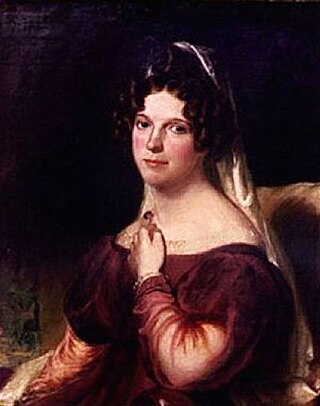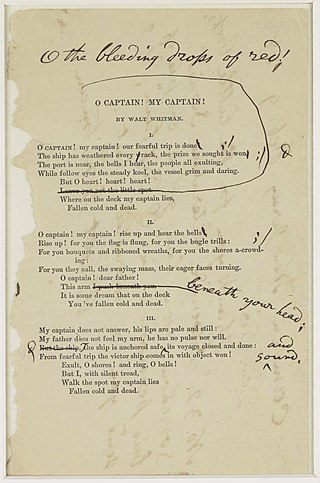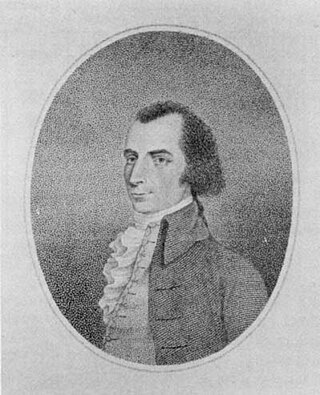
Felicia Dorothea Hemans was an English poet. Regarded as the leading female poet of her day, Hemans was immensely popular during her lifetime in both England and the United States, and was second only to Lord Byron in terms of sales.
This article contains information about the literary events and publications of 1770.

Philip Morin Freneau was an American poet, nationalist, polemicist, sea captain and early American newspaper editor sometimes called the "Poet of the American Revolution". Through his Philadelphia newspaper, the National Gazette, he was a strong critic of George Washington and a proponent of Jeffersonian policies.

"O Captain! My Captain!" is an extended metaphor poem written by Walt Whitman in 1865 about the death of U.S. president Abraham Lincoln. Well received upon publication, the poem was Whitman's first to be anthologized and the most popular during his lifetime. Together with "When Lilacs Last in the Dooryard Bloom'd", "Hush'd Be the Camps To-Day", and "This Dust Was Once the Man", it is one of four poems written by Whitman about the death of Lincoln.

Hugh Henry Brackenridge was an American writer, lawyer, judge, and justice of the Supreme Court of Pennsylvania.

A national poet or national bard is a poet held by tradition and popular acclaim to represent the identity, beliefs and principles of a particular national culture. The national poet as culture hero is a long-standing symbol, to be distinguished from successive holders of a bureaucratically-appointed poet-laureate office. The idea and honoring of national poets emerged primarily during Romanticism, as a figure that helped consolidation of the nation states, as it provided validation of their ethno-linguistic groups.

Julian Hawthorne was an American writer and journalist, the son of novelist Nathaniel Hawthorne and Sophia Peabody. He wrote numerous poems, novels, short stories, mysteries and detective fiction, essays, travel books, biographies, and histories.

John Trumbull was an American poet.
Nationality words link to articles with information on the nation's poetry or literature.
Nationality words link to articles with information on the nation's poetry or literature.
Nationality words link to articles with information on the nation's poetry or literature.
Nationality words link to articles with information on the nation's poetry or literature.
Nationality words link to articles with information on the nation's poetry or literature.
Nationality words link to articles with information on the nation's poetry or literature.

Charles McKnight was an American physician during and after the American Revolutionary War. He served as a surgeon and physician in the Hospital Department of the Continental Army under General George Washington and other subordinate commanders. McKnight was one of the most respected surgeons of his day and was remembered by one colleague as "particularly distinguished as a practical surgeon … at the time of his death (he) was without a rival in that branch of his profession."
Father Bombo's Pilgrimage to Mecca is an Orientalist prose satire and picaresque mock-epic coauthored by Philip Freneau and Hugh Henry Brackenridge while both men were juniors at the College of New Jersey.
The Wild Honey Suckle is a 1786 poem by American author Philip Freneau. Its style and tone is often considered a reaction to the neoclassicism of poets like Alexander Pope and an early anticipation of Romantic poetry. The poem was first printed on July 6, 1786 in the Columbian Herald.
Christopher Michael "Zithulele" Mann was a South African poet.
Adam's ale is a colloquial allusion meaning water. It alludes to the idea that the biblical Adam had only water to drink. This inference gained popularity around the beginning of the 19th-century temperance movement.
Harry Hayden Clark (1901–1971) was a professor of English, specializing in American literature. He was a Guggenheim Fellow for the academic year 1931–1932.








